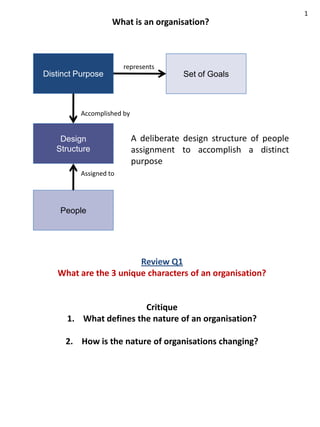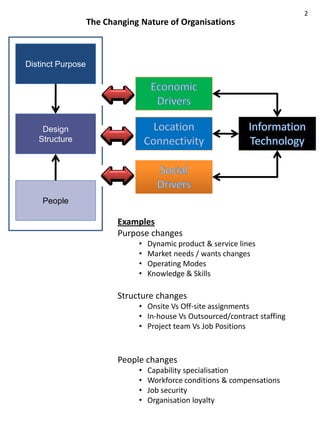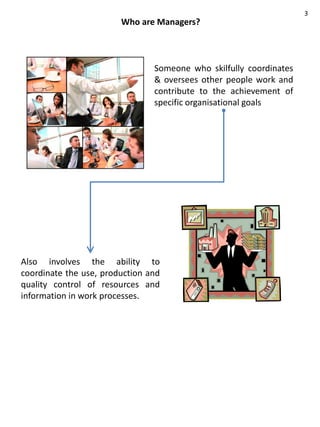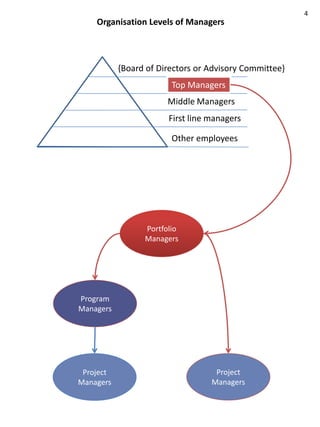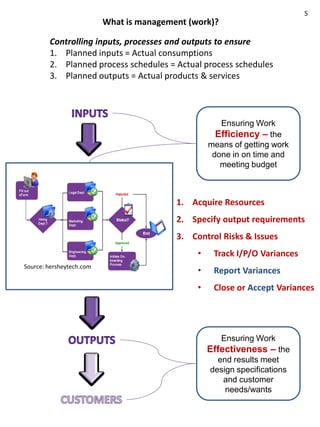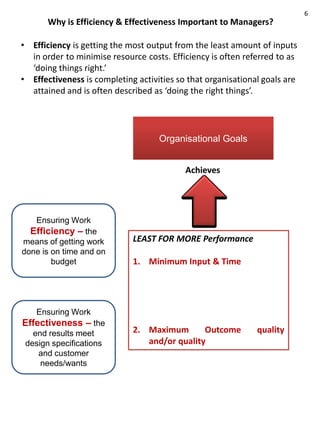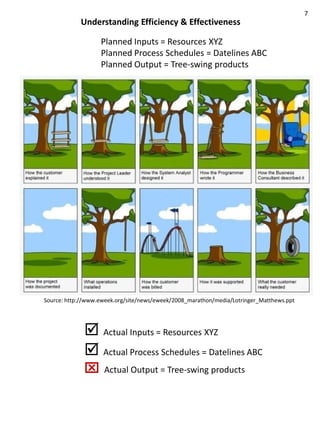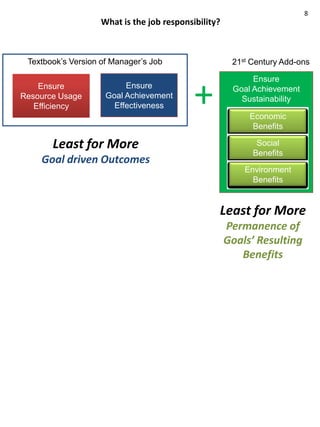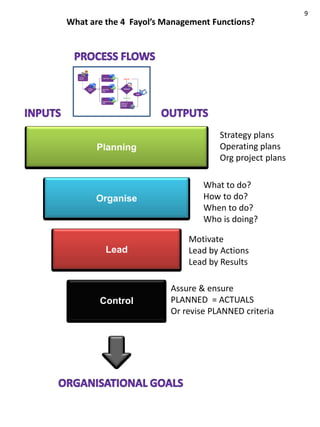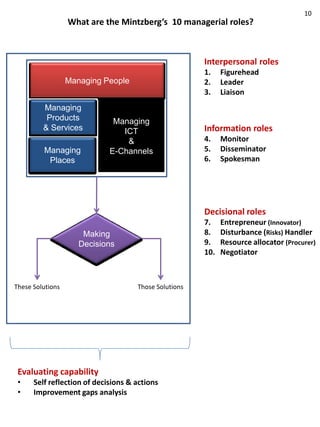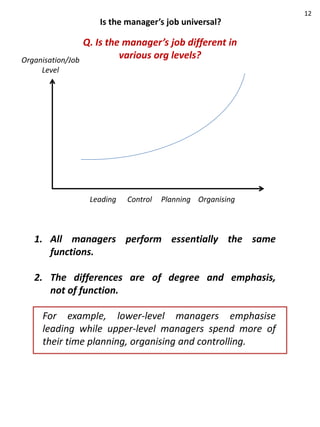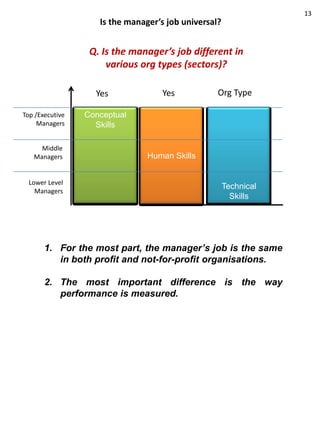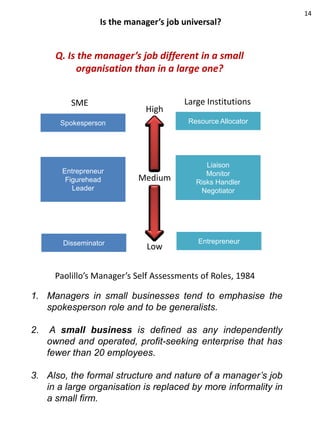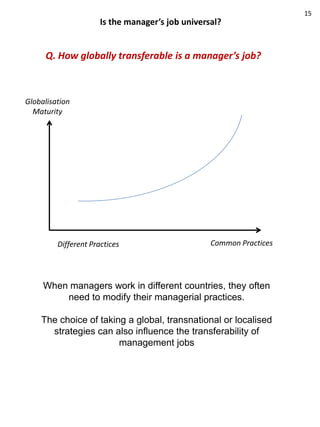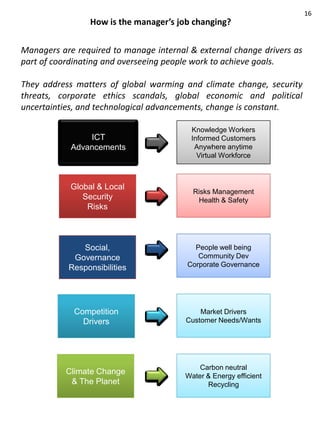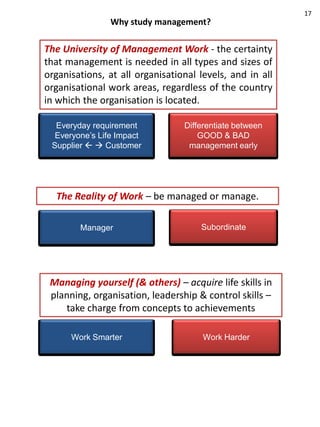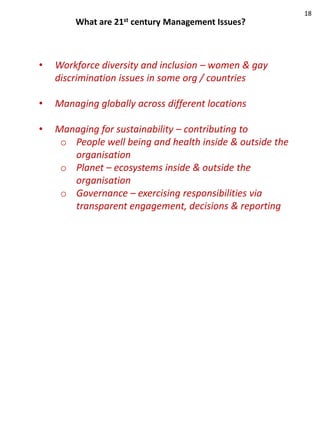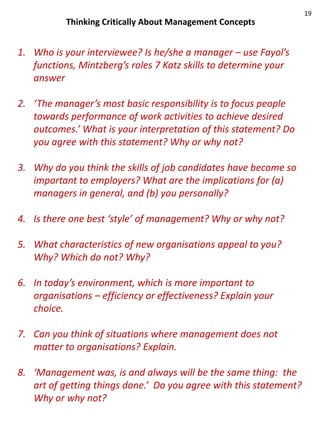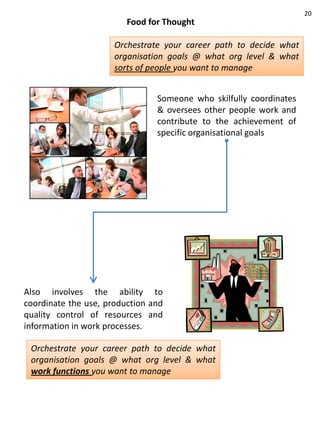Tut 2
- 1. 1 What is an organisation? represents Distinct Purpose Set of Goals Accomplished by Design A deliberate design structure of people Structure assignment to accomplish a distinct purpose Assigned to People Review Q1 What are the 3 unique characters of an organisation? Critique 1. What defines the nature of an organisation? 2. How is the nature of organisations changing?
- 2. 2 The Changing Nature of Organisations Distinct Purpose Design Structure People Examples Purpose changes ŌĆó Dynamic product & service lines ŌĆó Market needs / wants changes ŌĆó Operating Modes ŌĆó Knowledge & Skills Structure changes ŌĆó Onsite Vs Off-site assignments ŌĆó In-house Vs Outsourced/contract staffing ŌĆó Project team Vs Job Positions People changes ŌĆó Capability specialisation ŌĆó Workforce conditions & compensations ŌĆó Job security ŌĆó Organisation loyalty
- 3. 3 Who are Managers? Someone who skilfully coordinates & oversees other people work and contribute to the achievement of specific organisational goals Also involves the ability to coordinate the use, production and quality control of resources and information in work processes.
- 4. 4 Organisation Levels of Managers {Board of Directors or Advisory Committee} Top Managers Middle Managers First line managers Other employees Portfolio Managers Program Managers Project Project Managers Managers
- 5. 5 What is management (work)? Controlling inputs, processes and outputs to ensure 1. Planned inputs = Actual consumptions 2. Planned process schedules = Actual process schedules 3. Planned outputs = Actual products & services Ensuring Work Efficiency ŌĆō the means of getting work done in on time and meeting budget 1. Acquire Resources 2. Specify output requirements 3. Control Risks & Issues ŌĆó Track I/P/O Variances Source: hersheytech.com ŌĆó Report Variances ŌĆó Close or Accept Variances Ensuring Work Effectiveness ŌĆō the end results meet design specifications and customer needs/wants
- 6. 6 Why is Efficiency & Effectiveness Important to Managers? ŌĆó Efficiency is getting the most output from the least amount of inputs in order to minimise resource costs. Efficiency is often referred to as ŌĆśdoing things right.ŌĆÖ ŌĆó Effectiveness is completing activities so that organisational goals are attained and is often described as ŌĆśdoing the right thingsŌĆÖ. Organisational Goals Achieves Ensuring Work Efficiency ŌĆō the means of getting work LEAST FOR MORE Performance done is on time and on budget 1. Minimum Input & Time Ensuring Work Effectiveness ŌĆō the end results meet 2. Maximum Outcome quality design specifications and/or quality and customer needs/wants
- 7. 7 Understanding Efficiency & Effectiveness Planned Inputs = Resources XYZ Planned Process Schedules = Datelines ABC Planned Output = Tree-swing products Source: http://www.eweek.org/site/news/eweek/2008_marathon/media/Lotringer_Matthews.ppt ’āŠ Actual Inputs = Resources XYZ ’āŠ Actual Process Schedules = Datelines ABC ’üĖ Actual Output = Tree-swing products
- 8. 8 What is the job responsibility? TextbookŌĆÖs Version of ManagerŌĆÖs Job 21st Century Add-ons Ensure Ensure Resource Usage Efficiency Ensure Goal Achievement Effectiveness + Goal Achievement Sustainability Economic Benefits Least for More Social Benefits Goal driven Outcomes Environment Benefits Least for More Permanence of GoalsŌĆÖ Resulting Benefits
- 9. 9 What are the 4 FayolŌĆÖs Management Functions? Strategy plans Planning Operating plans Org project plans What to do? Organise How to do? When to do? Who is doing? Motivate Lead Lead by Actions Lead by Results Assure & ensure Control PLANNED = ACTUALS Or revise PLANNED criteria
- 10. 10 What are the MintzbergŌĆÖs 10 managerial roles? Interpersonal roles 1. Figurehead Managing People 2. Leader 3. Liaison Managing Products Managing & Services ICT Information roles & 4. Monitor Managing E-Channels 5. Disseminator Places 6. Spokesman Decisional roles 7. Entrepreneur (Innovator) Making 8. Disturbance (Risks) Handler Decisions 9. Resource allocator (Procurer) 10. Negotiator These Solutions Those Solutions Evaluating capability ŌĆó Self reflection of decisions & actions ŌĆó Improvement gaps analysis
- 11. 11 What are the KatzŌĆÖs Management Skills? Degree of Importance Top /Executive Conceptual Managers Skills Middle Managers Human Skills Lower Level Technical Managers Skills Know Know Know WHAT? WHO? HOW? WHERE? WHEN? WHY? Ideas Communicate Methods Concepts Motivate Techniques Visions Trust Procedures Goals Lead Models Directions Resolve/Will Actions Degree of Skills Specialisation Org Size
- 12. 12 Is the managerŌĆÖs job universal? Q. Is the managerŌĆÖs job different in Organisation/Job various org levels? Level Leading Control Planning Organising 1. All managers perform essentially the same functions. 2. The differences are of degree and emphasis, not of function. For example, lower-level managers emphasise leading while upper-level managers spend more of their time planning, organising and controlling.
- 13. 13 Is the managerŌĆÖs job universal? Q. Is the managerŌĆÖs job different in various org types (sectors)? Yes Yes Org Type Top /Executive Conceptual Managers Skills Middle Managers Human Skills Lower Level Technical Managers Skills 1. For the most part, the managerŌĆÖs job is the same in both profit and not-for-profit organisations. 2. The most important difference is the way performance is measured.
- 14. 14 Is the managerŌĆÖs job universal? Q. Is the managerŌĆÖs job different in a small organisation than in a large one? SME Large Institutions High Spokesperson Resource Allocator Liaison Entrepreneur Monitor Figurehead Medium Risks Handler Leader Negotiator Disseminator Entrepreneur Low PaolilloŌĆÖs ManagerŌĆÖs Self Assessments of Roles, 1984 1. Managers in small businesses tend to emphasise the spokesperson role and to be generalists. 2. A small business is defined as any independently owned and operated, profit-seeking enterprise that has fewer than 20 employees. 3. Also, the formal structure and nature of a managerŌĆÖs job in a large organisation is replaced by more informality in a small firm.
- 15. 15 Is the managerŌĆÖs job universal? Q. How globally transferable is a managerŌĆÖs job? Globalisation Maturity Different Practices Common Practices When managers work in different countries, they often need to modify their managerial practices. The choice of taking a global, transnational or localised strategies can also influence the transferability of management jobs
- 16. 16 How is the managerŌĆÖs job changing? Managers are required to manage internal & external change drivers as part of coordinating and overseeing people work to achieve goals. They address matters of global warming and climate change, security threats, corporate ethics scandals, global economic and political uncertainties, and technological advancements, change is constant. Knowledge Workers ICT Informed Customers Advancements Anywhere anytime Virtual Workforce Global & Local Risks Management Security Health & Safety Risks Social, People well being Governance Community Dev Responsibilities Corporate Governance Competition Market Drivers Drivers Customer Needs/Wants Carbon neutral Climate Change Water & Energy efficient & The Planet Recycling
- 17. 17 Why study management? The University of Management Work - the certainty that management is needed in all types and sizes of organisations, at all organisational levels, and in all organisational work areas, regardless of the country in which the organisation is located. Everyday requirement Differentiate between EveryoneŌĆÖs Life Impact GOOD & BAD Supplier ’ā¤ ’āĀ Customer management early The Reality of Work ŌĆō be managed or manage. Manager Subordinate Managing yourself (& others) ŌĆō acquire life skills in planning, organisation, leadership & control skills ŌĆō take charge from concepts to achievements Work Smarter Work Harder
- 18. 18 What are 21st century Management Issues? ŌĆó Workforce diversity and inclusion ŌĆō women & gay discrimination issues in some org / countries ŌĆó Managing globally across different locations ŌĆó Managing for sustainability ŌĆō contributing to o People well being and health inside & outside the organisation o Planet ŌĆō ecosystems inside & outside the organisation o Governance ŌĆō exercising responsibilities via transparent engagement, decisions & reporting
- 19. 19 Thinking Critically About Management Concepts 1. Who is your interviewee? Is he/she a manager ŌĆō use FayolŌĆÖs functions, MintzbergŌĆÖs roles 7 Katz skills to determine your answer 2. ŌĆśThe managerŌĆÖs most basic responsibility is to focus people towards performance of work activities to achieve desired outcomes.ŌĆÖ What is your interpretation of this statement? Do you agree with this statement? Why or why not? 3. Why do you think the skills of job candidates have become so important to employers? What are the implications for (a) managers in general, and (b) you personally? 4. Is there one best ŌĆśstyleŌĆÖ of management? Why or why not? 5. What characteristics of new organisations appeal to you? Why? Which do not? Why? 6. In todayŌĆÖs environment, which is more important to organisations ŌĆō efficiency or effectiveness? Explain your choice. 7. Can you think of situations where management does not matter to organisations? Explain. 8. ŌĆśManagement was, is and always will be the same thing: the art of getting things done.ŌĆÖ Do you agree with this statement? Why or why not?
- 20. 20 Food for Thought Orchestrate your career path to decide what organisation goals @ what org level & what sorts of people you want to manage Someone who skilfully coordinates & oversees other people work and contribute to the achievement of specific organisational goals Also involves the ability to coordinate the use, production and quality control of resources and information in work processes. Orchestrate your career path to decide what organisation goals @ what org level & what work functions you want to manage

